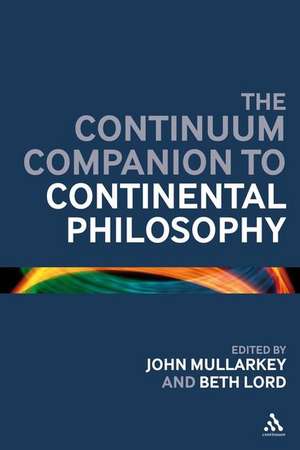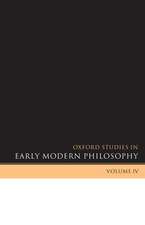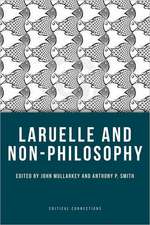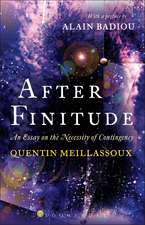The Continuum Companion to Continental Philosophy: Bloomsbury Companions
Editat de John Ó Maoilearca, Dr Beth Lorden Limba Engleză Hardback – 24 iun 2009
Din seria Bloomsbury Companions
- 43%
 Preț: 943.24 lei
Preț: 943.24 lei - 16%
 Preț: 258.54 lei
Preț: 258.54 lei - 21%
 Preț: 256.42 lei
Preț: 256.42 lei - 48%
 Preț: 626.47 lei
Preț: 626.47 lei -
 Preț: 822.27 lei
Preț: 822.27 lei - 17%
 Preț: 256.89 lei
Preț: 256.89 lei - 17%
 Preț: 257.81 lei
Preț: 257.81 lei - 44%
 Preț: 941.35 lei
Preț: 941.35 lei - 41%
 Preț: 226.40 lei
Preț: 226.40 lei -
 Preț: 771.53 lei
Preț: 771.53 lei - 12%
 Preț: 266.68 lei
Preț: 266.68 lei - 44%
 Preț: 940.38 lei
Preț: 940.38 lei - 17%
 Preț: 253.85 lei
Preț: 253.85 lei - 44%
 Preț: 937.45 lei
Preț: 937.45 lei - 45%
 Preț: 141.20 lei
Preț: 141.20 lei - 17%
 Preț: 254.58 lei
Preț: 254.58 lei - 27%
 Preț: 383.62 lei
Preț: 383.62 lei - 44%
 Preț: 938.96 lei
Preț: 938.96 lei - 7%
 Preț: 304.89 lei
Preț: 304.89 lei - 17%
 Preț: 239.59 lei
Preț: 239.59 lei - 12%
 Preț: 257.36 lei
Preț: 257.36 lei - 12%
 Preț: 255.97 lei
Preț: 255.97 lei - 17%
 Preț: 253.67 lei
Preț: 253.67 lei - 12%
 Preț: 264.39 lei
Preț: 264.39 lei - 16%
 Preț: 258.28 lei
Preț: 258.28 lei - 44%
 Preț: 937.06 lei
Preț: 937.06 lei - 41%
 Preț: 225.08 lei
Preț: 225.08 lei - 12%
 Preț: 254.58 lei
Preț: 254.58 lei - 22%
 Preț: 252.76 lei
Preț: 252.76 lei - 17%
 Preț: 255.51 lei
Preț: 255.51 lei - 41%
 Preț: 193.99 lei
Preț: 193.99 lei - 36%
 Preț: 871.22 lei
Preț: 871.22 lei - 44%
 Preț: 938.96 lei
Preț: 938.96 lei - 17%
 Preț: 254.14 lei
Preț: 254.14 lei -
 Preț: 930.14 lei
Preț: 930.14 lei - 11%
 Preț: 267.60 lei
Preț: 267.60 lei - 36%
 Preț: 944.19 lei
Preț: 944.19 lei - 10%
 Preț: 271.74 lei
Preț: 271.74 lei - 26%
 Preț: 1161.10 lei
Preț: 1161.10 lei - 43%
 Preț: 220.26 lei
Preț: 220.26 lei - 12%
 Preț: 263.56 lei
Preț: 263.56 lei - 43%
 Preț: 925.87 lei
Preț: 925.87 lei -
 Preț: 270.06 lei
Preț: 270.06 lei
Preț: 868.38 lei
Preț vechi: 1539.47 lei
-44% Nou
Puncte Express: 1303
Preț estimativ în valută:
166.22€ • 180.61$ • 139.71£
166.22€ • 180.61$ • 139.71£
Carte tipărită la comandă
Livrare economică 21 aprilie-05 mai
Preluare comenzi: 021 569.72.76
Specificații
ISBN-13: 9780826498304
ISBN-10: 0826498302
Pagini: 432
Dimensiuni: 156 x 234 x 30 mm
Greutate: 0.77 kg
Editura: Bloomsbury Publishing
Colecția Continuum
Seria Bloomsbury Companions
Locul publicării:London, United Kingdom
ISBN-10: 0826498302
Pagini: 432
Dimensiuni: 156 x 234 x 30 mm
Greutate: 0.77 kg
Editura: Bloomsbury Publishing
Colecția Continuum
Seria Bloomsbury Companions
Locul publicării:London, United Kingdom
Caracteristici
Continental Philosophy is a very strong area for Continuum and we have an excellent reputation within the subject area. As a result, we have been able to attract an impressive list of contributors.
Cuprins
Notes on Contributors\1. Introduction, Beth Lord (University of Dundee, UK)\2. Research Problems and Methodology: Three Paradigms and a Thousand Exceptions, James Burton (Goldsmiths College, University of London, UK)\3. The Continental Tradition: Kant, Hegel, Nietzsche, Gary Banham (Manchester Metropolitan University, UK)\Part I: Contemporary Continental Philosophy\4. Metaphysics and Ontology, Daniel W. Smith (Purdue University, USA)\5. Philosophies of Consciousness and the Body, John Protevi (Louisiana State University, USA)\6. Philosophies of Difference, Todd May (Clemson University, USA)\7. Politics and Ethics, Caroline Williams (Queen Mary, University of London, UK)\8. Continental Marxist Thought, Bill Martin (DePaul University, USA)\9. Psychoanalysis and Philosophy, Hector Kollias (King's College London, UK)\10. Feminist Philosophy, Rosi Braidotti (Utrecht University, the Netherlands)\11. Philosophies of Life, Dorothea Olkowski (University of Colorado, USA)\12. Philosophies of Science, Andrew Aitken (Goldsmiths College, University of London, UK)\13. Philosophies of Art, Jonathan Lahey Dronsfield (University of Reading, UK)\14. Philosophy, Literature and Interpretation, Douglas Burnham and Melanie Ebdon (both Staffordshire University, UK)\15. The Future of Continental Philosophy, John Mullarkey (University of Dundee, UK)\Part II: Resources\16. A-Z of Key Terms and Thinkers\17. Chronology, James Burton (Goldsmiths College, University of London, UK)\18. Research Resources\Notes\Bibliography\Index
Recenzii
"This book teaches us that there is a good deal going on today under the banner of 'continental philosophy' that neither starts with Kant nor ends with post-structuralism. Without looking over its shoulder at every turn, it provides an overview of the thematic areas that belong to 'continental philosophy' as it is actually conceived and practiced today, highlighting especially that it is no longer a matter of applying philosophical 'theory' to other disciplines, but more and more a distinctive way of engaging in those other disciplines themselves." - Simon Glendinning, Reader in European Philosophy, London School of Economics and Political Science, UK
Mullarkey and Lord have done a great service to students and researchers with the publication of The Continuum Companion to Continental Philosophy. While the historical appendixes alone make the book supremely useful for students and teachers, the true brilliance of the book is its focus not on the leading figures of the field but on the practices of Continental philosophy as well as the problems that concern it. With this focus the editors and contributors show us not who Continental philosophy has been, but what Continental philosophy does and can do.
Mullarkey and Lord have done a great service to students and researchers with the publication of The Continuum Companion to Continental Philosophy. While the historical appendixes alone make the book supremely useful for students and teachers, the true brilliance of the book is its focus not on the leading figures of the field but on the practices of Continental philosophy as well as the problems that concern it. With this focus the editors and contributors show us not who Continental philosophy has been, but what Continental philosophy does and can do.



















